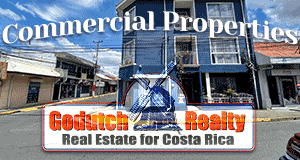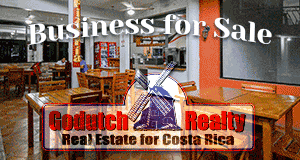Estimated Reading Time: 7 Minutes
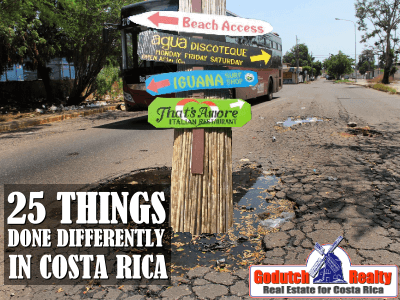
Let me show how different things can be in Costa Rica. I am going back to an old theme here, but the culture of Costa Rica is a constant source of amazement to me.
Here are a few differences I have observed.
In Costa Rica, there are many things different than what we are used to.
- Stop in the traffic lane of a street and (maybe) turn on the hazard warning lights while you take a quick run into a store.
- Dump your household gray water (sinks, showers, washing machine water) into the street.
- Drive toward oncoming traffic with high beam headlights AND auxiliary lights on.
- Have your water meter physically removed if you fail to pay the bill on time.
- Store propane containers in a designated “Smoking Area.”
- Get broken things “fixed” that would be deemed “unfixable” and thrown away back home.
- Hand out half-once samples of rum, vodka, scotch, wine, etc. to passers-by in a grocery store. (But never bourbon. Boo!)
- Blow your vehicle’s horn for any reason. This one requires expansion – vehicle horns are mandated to operate, by CR law, and it is easy to see why – Ticos tend to use them a lot. In more sophisticated countries car horns are rarely used, except as a last-minute warning or to signal great displeasure. In some places, their indiscriminate use can even net the user a fine.
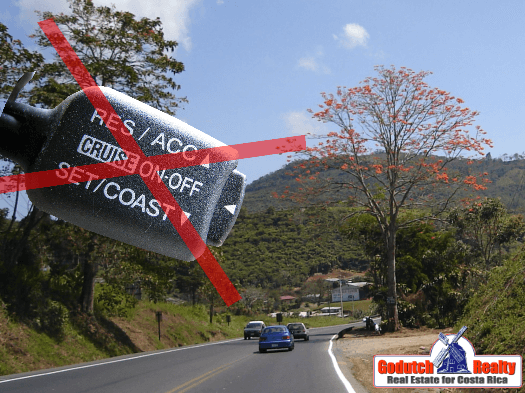
Vehicle horns
In Costa Rica, drivers use vehicle horns in a multitude of other ways. A bit different than we are used to:
- Signal the vehicle(s) ahead of you that the traffic light has changed.
- Notify other potential travelers you are approaching when entering a blind corner.
- Say “here I am” (often used by motorcyclists riding in a blind spot but intent on passing).
- Say “I’m waiting outside – hurry up.”
- Pass a greeting to someone in another car or walking on the sidewalk.
- Notify another vehicle, for instance, one emerging from a parking space, that, “I’m coming, and I don’t intend to slow down for you.”
- Request permission to turn or merge ahead of you, and, or, to say, “Please,” or “Thank You,” for allowing them to turn or merge.
The expat driver who is used to any occurrence of horn blowing as a signal of imminent danger, a bit of confusion can occur when they encounter a random horn blast; the standard reaction is, “What did I do wrong?”
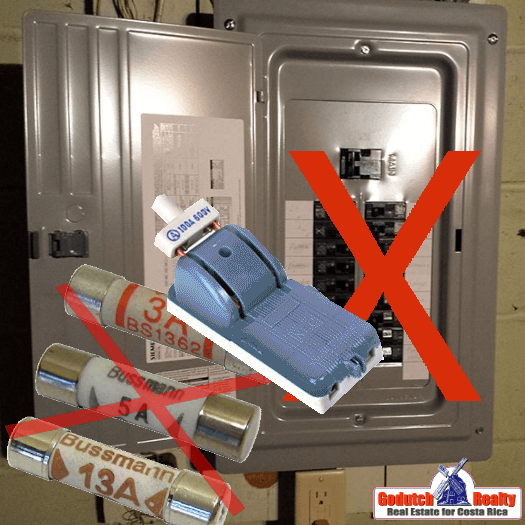
Unique
Other things different that I find unique to Costa Rica:
Cruise control
New vehicles sold here are not available with “cruise control.” (Where could you ever use it?)
Display
Food stores employ people who constantly arrange the packages on the shelves so that the shelf always looks full.
Naked
When conducting a sale, clothing stores will frequently put the mannequins in their display windows “naked” – that is, without any covering or clothing. (That gives a new meaning to “half-off” sales.)
Breakers
You won’t often find circuit breakers, or even glass fuses, in older Tico homes. Commonly, the main distribution point for all household electrical services will be a single, old-fashioned knife switch, without a fuse, and with bare wires and connections exposed. These are often located in the bathroom where an uncovered “box” may also do double duty as a medicine or storage cabinet.
Car maintenance
Many Ticos are obsessive about keeping up their vehicle’s appearance – they don’t comprehend the gringo attitude that a vehicle is an appliance to be used and not necessarily cleaned frequently. (However, doing routine maintenance things, like changing the oil, is sometimes overlooked.)
Addresses
Possibly due to the effects of the sun and problems with the underlying structural materials, Ticos frequently repaint their homes. Often, when they do, they will change the color; one year a house will be yellow with a black fence, the next year it will be orange with a brown fence. This can mean problems with “addresses” because they are frequently keyed to a general physical description. So, if your address is something like: Heredia Oeste, Walmart, 300 metros Sur, 30 metros Este, cerca la casa verde (next to the green house, 300 meters south, 30 meters east of the Walmart in West Heredia), and your neighbor changes their house color from yellow to green, mail and bill delivery can suddenly cease (or you might find you are getting mail and bills for some other casa.)
Painting
Although Ticos will paint their houses bright, pastel colors (orange, yellow, and green are popular choices) that pallet does not extend to their vehicles. White, silver, grey, pale gold, and maybe black or dark blue, are the most common. Looking at a parking lot is an exercise in bland.
TV Promos
TV stations often have no commercials (which can occur randomly during a program) between program breaks, but instead will run a half dozen or more program promos back-to-back. (And they will run the same ones over and over and over and over and…)
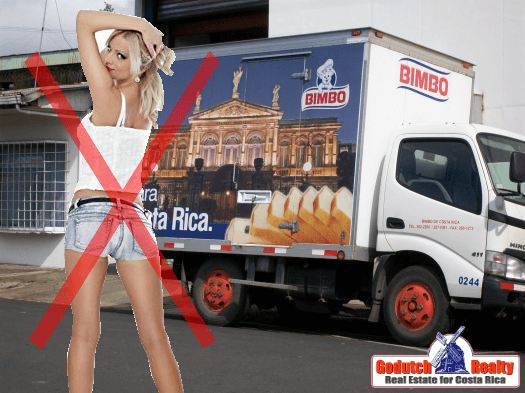
Bimbo
I was going to make a “cute” entry about Bimbo bread and how the word “bimbo” has a totally different connotation in North America. That is until I learned that Bimbo is one of the world’s largest bakery companies. They are in 19 countries worldwide and have a large presence in the USA and Canada. In fact, Bimbo Bakeries USA is the nation’s largest bakery company. They market under many well-known brands, such as Entenmann’s, Thomas’, Arnold, Earthgrains, and Sara Lee. (Yes, THAT Sara Lee). So, now when I see their corporate logo emblazoned on the shirt of some pretty girl on the street, I know it’s not a personal reference.
Potholes
Last, a safety tip: Do you encounter a three-or-four foot tall plant of some sort (living or dead) suddenly “growing” up out of a paved street where there was none before? Possibly with a plastic bag or beer can attached? It’s not some tropical freak of nature. It’s a sign that there is a major hole in the road (possibly where someone has stolen a manhole cover) that should be avoided. Someone has kindly put the object there to warn other motorists to avoid it.
Of course, this shortlist of things different is only the tip of a large iceberg of many things that are different here. Check this list of jaw-dropping ways to make things work in Costa Rica also.
The Author
By Allen Dickinson, who writes for and is the editor of the bi-monthly magazine El Residente. This magazine is sent digitally to the ARCR Members. They feature articles on Immigration, residency, and laws of Costa Rica. Also, you will find articles on learning Spanish, living in Costa Rica, retirement, and items of interest to foreigners in the country.
If you like this blog, subscribe to my newsletter by clicking the banner below.
I DO want to remind our readers that we appreciate any referrals you can send us. Also, remember GoDutch Realty when talking about your home in Costa Rica to friends and family. We appreciate it.










